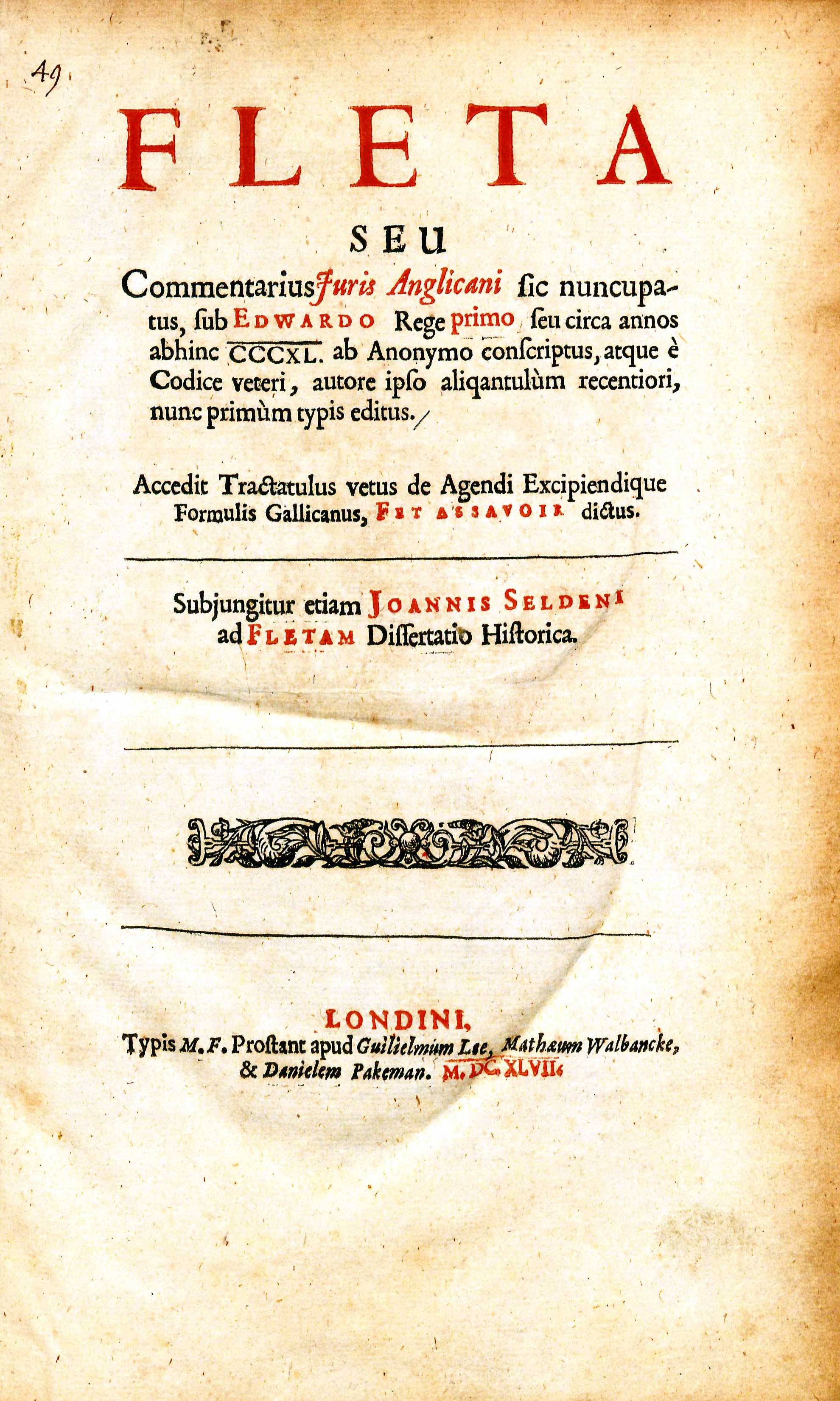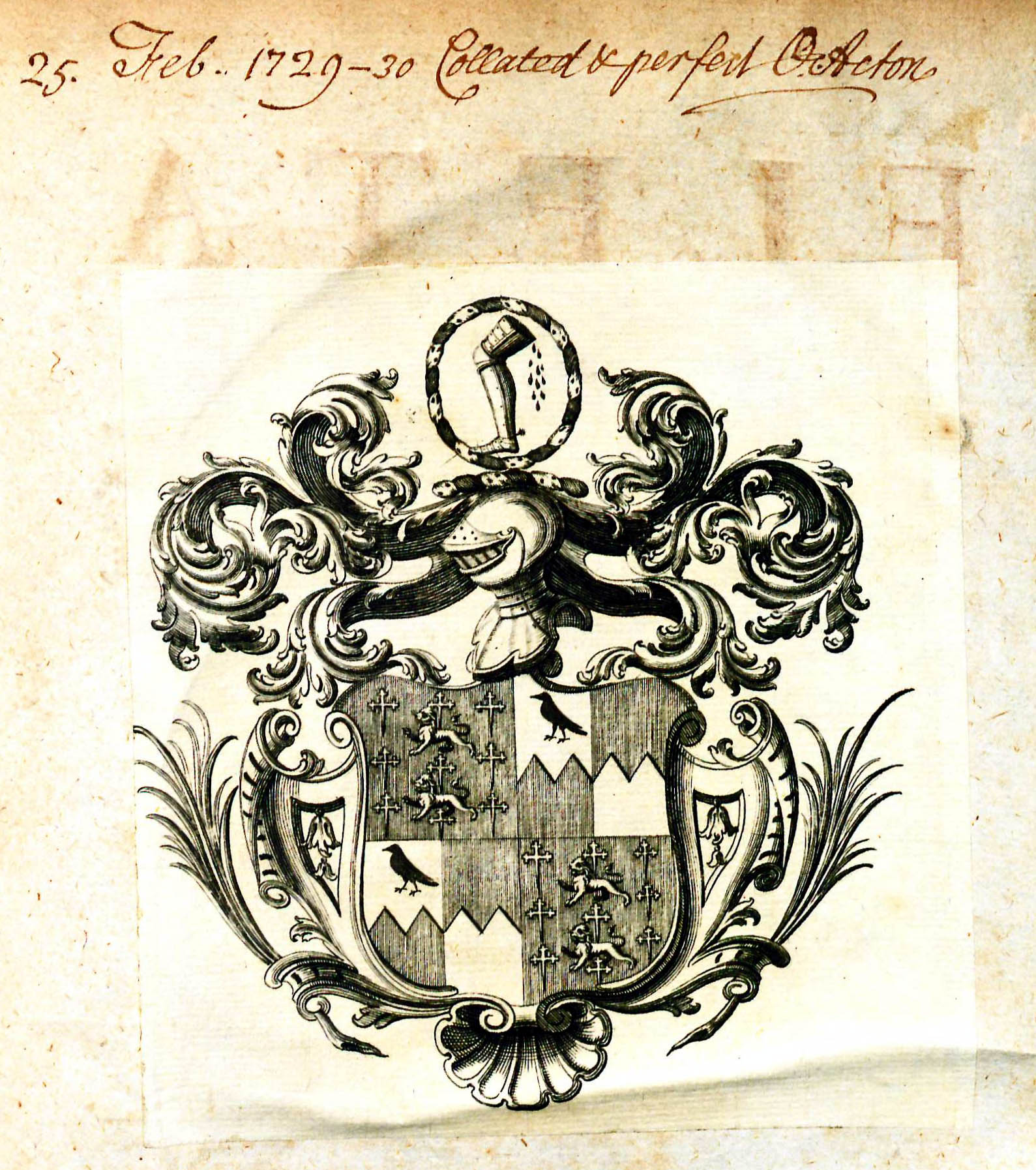Fleta: Seu Commentarius Juris Anglicani Sic Nuncupatus: Sub Edwardo Rege Primo, Seu Circa Annos Abhince CCCXL, ab Anonymo Conscriptus, Atque È Codice Veteri, Autore Ipso Aliqantulùm Recentiori, Nunc Primùm Typis Editus : Accedit Tractatulus Vetus De Agendi Excipiendique Formulis Gallicanus, Fet Assavoir Dictus
| Fleta | |
|
Title page from Fleta, George Wythe Collection, Wolf Law Library, College of William & Mary. | |
| Editor | John Selden |
| Published | London: Typis M.F. prostant apud Guilielmium Lee, Mathaeuem Wabancke & Danielem Pakeman |
| Date | 1647 |
| Edition | First |
| Language | Latin |
| Pages | [8], 553 (i.e. 555), [5] |
| Desc. | 4to (22 cm.) |
| Location | Shelf F-4 |
Along with Britton, Fleta has been described as "one of the two leading text-books of Edward I's reign"[1] and little more than a summary of Bracton's De Legibus et Consuetudinibus Angliae brought up to date.[2] Fleta was composed by an unknown author who may have held an office in the royal household, or perhaps was one of the judges Edward I punished in 1289, but "it was never much read."[3]
Hugh Blair Grigsby, Chancellor of the College of William & Mary (1871–1881), uses Fleta as an example when comparing the literary habits of Judges Pendleton and Wythe:
Evidence for Inclusion in Wythe's Library
Ordered by Wythe from John Norton & Sons in a letter dated May 29, 1772. Records indicate the order was fulfilled.[5] All of the Wythe Collection sources (Goodwin's Study[6], Dean's Memo[7], Brown's Bibliography[8] and George Wythe's Library[9] on LibraryThing) list the 1647 edition as the probable one owned by Wythe. The Wolf Law Library followed their advice and purchased that edition.
Description of the Wolf Law Library's copy
Rebound in twentieth-century calf with four raised bands and red, gilt-lettered labels. Includes water mark on last blank page. Verso of title page features the inscription "25. Feb. 1729-30 Collated & perfect O.Acton" and an unknown bookplate with coat of arms.
Images of the library's copy of this book are available on Flickr. View the record for this book in William & Mary's online catalog.
See also
References
- ↑ William Holdsworth, A History of English Law (London: Methuen & Co, Sweet and Maxwell, 1936), 238.
- ↑ Holdsworth, A History of English Law, 238.
- ↑ Holdsworth, A History of English Law, 321-322.
- ↑ Hugh Blair Grigsby, The Virginia Convention of 1776 (Richmond, VA: J.W. Randolph, 1855), 126.
- ↑ Frances Norton Mason, ed., John Norton & Sons, Merchants of London and Virginia: Being the Papers from their Counting House for the Years 1750 to 1795 (Richmond, Virginia: Dietz Press, 1937), 242-243. The letter is endorsed "Virga. 29 May 1772 / George Wythe / Recd. 21 September / Goods Entr. pa. 163/ Ans. the March 1773."
- ↑ Mary R. M. Goodwin, The George Wythe House: Its Furniture and Furnishings (Williamsburg, Virginia: Colonial Williamsburg Foundation Library, 1958), XLVII.
- ↑ Memorandum from Barbara C. Dean, Colonial Williamsburg Found., to Mrs. Stiverson, Colonial Williamsburg Found. (June 16, 1975), 7 (on file at Wolf Law Library, College of William & Mary).
- ↑ Bennie Brown, "The Library of George Wythe of Williamsburg and Richmond," (unpublished manuscript, May, 2012) Microsoft Word file. Earlier edition available at: https://digitalarchive.wm.edu/handle/10288/13433.
- ↑ LibraryThing, s.v. "Member: George Wythe," accessed on June 28, 2013.

